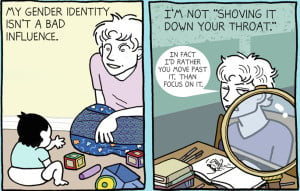The scene opens with an unsuspecting woman taking a shower. Through the shower curtain, we see a figure approach her. As violins screech in the background, he throws the shower curtain aside and repeatedly stabs her in the back, leaving her for dead.
We later learn that the killer, Norman Bates, has multiple personalities and deep seated mommy issues. He is the main antagonist of the film Psycho, and the shower scene is one of the most iconic in recent horror movie history.
Psycho killers, crazy girlfriends, unhinged stalkers, languishing mental patients, and schizo criminals—these are the mentally ill according to Hollywood. They are written to seem out of control, confusing, or scary.
All too often, media portrayals of the mentally ill reflect our culture’s fear and ignorance about mental illness.
The fact is, you’re more likely to see scantily clad women getting lobotomized in an old school mental asylum than you are a sensitive media portrayal of mental illness or the mental health industry.
And, according to some research, seeing so many stereotyped fictional characters with mental illness impacts how we see real people with mental illnesses.
Television shows depict being the victim of violence as more desirable than being mentally ill. Because the media is meant to entertain, depictions of the mentally ill are sensationalized.
To help separate fact from fiction, below are some media-perpetuated myths about mental illness so you don’t project these stereotypes onto people with mental illness:
Myth 1 – Mentally Ill People Are Violent
As many as 61% of Americans believe that people with schizophrenia have violent tendencies. The media perpetuates this view of mental illness by linking violent events and characters with madness, even though the mentally ill are more likely to be victims of violent crimes than perpetrators in real life.
Take a movie like The Dark Knight as an example. The Joker’s motives for wreaking havoc on Gotham city are never fully explained. He seems to be bombing hospitals in nurse outfits not because he’s spreading some coherent message of villainy—he’s just a lunatic.
We might be inclined to give The Dark Knight a pass because it’s pure fiction, but news outlets try to link mental illness with violence when reporting true stories. This Huffington Post article about the James Holmes mass shooting describes “cracks in the mental health system” at his school.
Whether more could have been done to prevent the shooting or not, the portrayal of symptoms like psychosis as markers of violence is problematic since most people with psychosis are not violent.
Myth 2 – Mentally Ill People Are Beyond Help
In the media, when a criminal or violent person is mentally ill, the illness is overdramatized. When a successful person is mentally ill, the illness is downplayed. As a result, successful people with mental illness are not very visible on the news, in television, in movies, or in video games. Even in real life, people avoid seeking help for mental health problems to protect their careers and credibility.
Shutter Island is one movie that invokes this myth in a few ways. Spoiler alert: a bipolar character in the movie drowns her children and gets shot by her husband, who goes mad himself. Since the film is set in the 1950’s, the mental health system is depicted as so broken that it aggravates the mental conditions it sets out to cure.
Myth 3 – Mentally Illness Makes People Geniuses and Savants
This is the inverse of the last myth, where successful people with mental illness are depicted, but only if they are extraordinarily gifted savants. This romanticizes mental illness, turning it into an acceptable spectacle. Since mental illness has been linked to creative professions, it may also be seen as the romantically tragic affliction of “tortured” artists like van Gogh.
A Beautiful Mind, for example, isn’t an unsympathetic portrayal of mental illness but it is a romanticized one. Based on the biography of mathematician John Nash, it includes an inaccurate portrayal of schizophrenia symptoms and rearranging of biographical details for dramatic effect.
Myth 4 – Mental Illness is Sexy, Cool and Mysterious
Some people think the mental health industry or mental illness can be used to make characters more interesting, mysterious, or sexy because they are a sort of exotic other who does not think like “normal” society. The most common portrayals of this myth are heavily traumatized women.
The 2011 movie Suckerpunch exploits this trope in a big way. The film takes place in an asylum/brothel where the scantily clad mental patients have high-octane fantasies about killing the abusive staff. It also includes a lot of imagery connecting mental illness with helplessness, escapism, and sexual exploitation.
Inaccurate portrayals of mental illness in the media are going to happen. After all, the goal is to entertain people, not teach them.
However, the media affects public perception. It is important for us to distinguish between media sensationalism and mundane reality.
The mundane reality is that mentally ill people are not unusually violent, broken, gifted, or entertaining. Getting sick is something that happens to everyone, and since our bodies and minds are linked and not separate, mental illness is no more sensational than physical sickness.
So if you or a friend is experiencing mental illness, avoid looking to media representations to educate yourself. There are plenty of resources on mental health, including those listed below, which can help you learn more about living with mental illness.
In many cases people with mental illness need people they can feel comfortable reaching out to in crisis situations, like suicide attempts, self-harm injuries, or nervous breakdowns.
Or they may simply need a non-judgmental friend who acknowledges that they can’t just “snap” out of it.
To be that friend, we need to understand that mental illness is not a sign of weakness or inadequacy.
In fact, living with or overcoming mental illness takes a lot of strength and when needed, support.
Resources:
- National Alliance on Mental Illness (NAMI): www.nami.org
- Mental Health America (MHA): www.mha.org
- Psych Central: www.psychcentral.com
- Healthy Place: www.healthyplace.com
Jarune Uwujaren is a Contributing Writer for Everyday Feminism. A Nigerian-American recent graduate who’s stumbling towards a career in writing, Jarune can currently be found drifting around the DC metro area with a phone or a laptop nearby. When not writing for fun or profit, Jarune enjoys food, fresh air, good books, drawing, poetry, and sci-fi.
Search our 3000+ articles!
Read our articles about:
Our online racial justice training
Used by hundreds of universities, non-profits, and businesses.
Click to learn more
Most Read Articles
- « Previous
- 1
- …
- 30
- 31
- 32




















